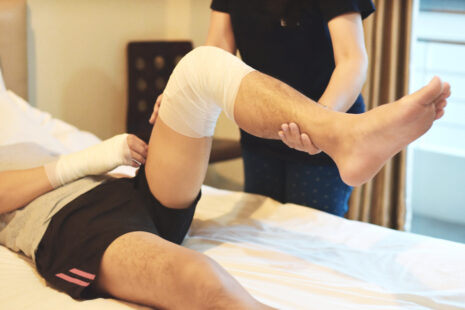Persistent knee pain can be frustrating and may persist for various reasons, including underlying structural issues, overuse injuries, biomechanical issues, or inadequate treatment and rehabilitation.
Here are several potential reasons why your knee pain may not be going away…
- Underlying Injury or Condition – Chronic knee pain may be due to an underlying injury or medical condition, such as:
- Ligament injuries (e.g., ACL tear, MCL tear)
- Meniscal tears or cartilage damage
- Patellar tendinitis or patellar tracking issues
- Osteoarthritis or rheumatoid arthritis
- Bursitis or synovitis
- IT band syndrome or runner’s knee
- Patellofemoral pain syndrome
- Overuse or Repetitive Strain – Excessive or repetitive stress on the knee joint, such as from high-impact activities, repetitive movements, or poor biomechanics, can lead to overuse injuries and chronic pain.
- Muscle Weakness or Imbalance – Weakness or imbalance in the muscles surrounding the knee, such as the quadriceps, hamstrings, or hip abductors, can affect joint stability and contribute to knee pain.
- Poor Biomechanics or Alignment – Issues with biomechanics, gait, or alignment of the lower extremities (e.g., flat feet, overpronation, leg length discrepancy) can place abnormal stress on the knee joint and lead to pain and dysfunction.
- Inadequate Rehabilitation – Incomplete or inadequate rehabilitation following a knee injury, surgery, or period of rest may result in lingering pain, weakness, or instability in the knee joint.
- Overweight or Obesity – Excess body weight can increase the load on the knee joint and exacerbate pain, particularly in weight-bearing activities such as walking, running, or climbing stairs.
- Lifestyle Factors – Certain lifestyle factors, such as sedentary behavior, poor nutrition, smoking, or inadequate sleep, can impact overall joint health and contribute to persistent knee pain.
- Psychosocial Factors – Psychological factors such as stress, anxiety, depression, or fear of pain may influence pain perception and affect your ability to cope with and recover from knee pain.
If your knee pain persists despite conservative measures such as rest, ice, compression, elevation (RICE), over-the-counter pain medications, and exercises to strengthen and stretch the muscles around the knee, it’s essential to consult with a healthcare professional for a comprehensive evaluation and appropriate treatment recommendations. A doctor, physical therapist, or orthopedic specialist can assess your knee pain, identify the underlying cause, and develop a personalized treatment plan tailored to your specific condition and needs. This may include additional diagnostic tests (e.g., imaging studies), medications, physical therapy, injections, or in some cases, surgical intervention, depending on the severity and nature of the knee problem. Early intervention and proper management are key to addressing knee pain effectively and preventing further complications.




